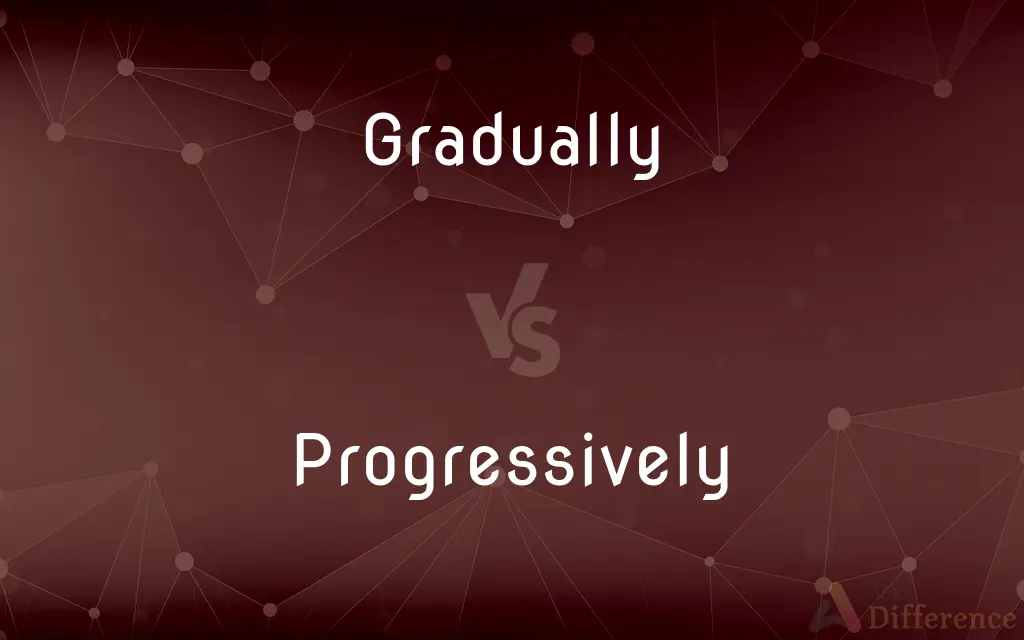Gradually vs. Progressively — What's the Difference?
By Urooj Arif & Maham Liaqat — Updated on March 14, 2024
Gradually emphasizes slow, step-by-step change, while progressively focuses on steady improvement or advancement.

Difference Between Gradually and Progressively
Table of Contents
ADVERTISEMENT
Key Differences
Gradually refers to changes that occur in small, often imperceptible steps over time, suggesting a slow and steady pace without a defined endpoint. On the other hand, progressively implies a deliberate process of improvement or development, often with a goal or endpoint in mind.
While gradually may denote changes that are not necessarily directed towards a specific goal, progressively suggests a forward or onward movement, often with an aim of achieving better states or stages.
Gradually is often used in contexts where changes are natural or expected, such as aging or the changing of seasons. Progressively, however, is frequently used in contexts that involve deliberate efforts for improvement, such as in education, technology, or social reforms.
In some contexts, gradually can be used to describe a process that might not lead to significant changes or improvements, merely indicating a slow pace of change. Conversely, progressively implies a more positive trajectory, suggesting that each step leads closer to a particular aim or betterment.
Gradually might imply a passive process, where changes happen over time without much intervention. Progressively suggests a more active process, often involving deliberate actions or interventions to ensure improvement or advancement.
ADVERTISEMENT
Comparison Chart
Pace
Slow and steady
Steady with a focus on improvement
Goal orientation
Not necessarily goal-directed
Often goal-directed
Context of use
Natural or expected changes
Deliberate efforts for improvement
Implication of change
Subtle, possibly insignificant
Positive, towards betterment
Nature of process
Passive
Active
Compare with Definitions
Gradually
Occurring in small degrees over time.
The day gradually brightened as the sun rose.
Progressively
Increasing in extent or severity.
The discussions became progressively more complex.
Gradually
Characterized by a slow and steady pace.
He gradually improved his language skills.
Progressively
Indicating continuous improvement.
The software updates progressively enhanced performance.
Gradually
Not necessarily goal-directed.
The temperature gradually dropped overnight.
Progressively
Advancing in stages towards a goal.
The disease progressed more rapidly than expected.
Gradually
Referring to subtle or minimal change.
The leaves gradually changed color in the fall.
Progressively
Suggesting a positive direction of change.
The patient's condition improved progressively.
Gradually
Often used in natural or expected contexts.
She gradually accepted the inevitable.
Progressively
Used in contexts of deliberate efforts.
Society is moving progressively towards equality.
Gradually
Occurring or developing slowly or by small increments
Gradual erosion.
A gradual slope.
Progressively
Moving forward; advancing.
Gradually
The liturgical book containing the chants for the Mass.
Progressively
Proceeding in steps; continuing steadily by increments
Progressive change.
Gradually
A biblical text sung between the Epistle and the Gospel of the Mass.
Progressively
Open to or favoring new ideas, policies, or methods
A progressive politician.
Progressive business leadership.
Gradually
In a gradual manner; making slow progress; slowly.
Progressively
Progressive Of or relating to a Progressive Party
The Progressive platform of 1924.
Gradually
(obsolete) by degrees
Progressively
Of or relating to progressive education
A progressive school.
Gradually
In a gradual manner.
Progressively
Increasing in rate as the taxable amount increases
A progressive income tax.
Gradually
In degree.
Human reason doth not only gradually, but specifically, differ from the fantastic reason of brutes.
Progressively
Tending to become more severe or wider in scope
Progressive paralysis.
Gradually
In a gradual manner;
The snake moved gradually toward its victim
Progressively
(Grammar) Designating a verb form that expresses an action or condition in progress.
Progressively
(Music) Of or being a style that emphasizes virtuoso technique, rhythmic and melodic complexity, and unconventional forms and instrumentation
Progressive rock.
Progressive jazz.
Progressively
A person who is open to or favors new ideas, policies, or methods, especially in politics.
Progressively
Progressive A member or supporter of a Progressive Party.
Progressively
(Grammar) A progressive verb form.
Progressively
In a progressive manner.
Progressively
As part of a progression.
Progressively
Advancing in amount or intensity;
She became increasingly depressed
Common Curiosities
Is gradual change always slow?
Gradual change is typically slow, emphasizing a pace that allows for small, incremental steps rather than quick or abrupt transitions.
How do gradual and progressive changes differ in terms of goals?
Gradual changes do not necessarily imply a specific goal or direction, focusing more on the pace of change, whereas progressive changes often have a goal-oriented nature, aiming towards improvement or advancement.
Can something change progressively without being gradual?
Yes, something can change progressively without being gradual if it advances or improves in stages that are noticeable or significant, rather than subtle or slow.
Are all gradual changes also progressive?
Not all gradual changes are progressive, as some may not lead towards improvement or a specific goal, but simply denote slow transformation.
What does it mean for something to change gradually?
To change gradually means to undergo transformation or development in small, often subtle steps over time, without a rapid or noticeable pace.
Can progressive change be negative?
While progressive change generally implies improvement or advancement towards a positive goal, it can sometimes refer to the increasing severity or extent of something, which could be perceived negatively, depending on the context.
Can a process be both gradual and progressive?
A process can be both gradual and progressive if it involves slow, incremental steps that are aimed towards a specific goal or improvement.
Is gradual change more common in nature?
Gradual change is often associated with natural or expected processes, such as growth, aging, or seasonal transitions.
How does the context affect the use of gradually vs. progressively?
The context greatly influences the choice between gradually and progressively, with gradually being preferred in natural, subtle processes and progressively in goal-oriented, deliberate improvements.
Do progressive changes require deliberate effort?
Progressive changes often involve deliberate actions or interventions, especially in contexts like social reforms, education, or technological advancements.
Can the pace of gradual change vary?
The pace of gradual change can vary but remains slow and steady, allowing for the process to be barely noticeable or imperceptible at times.
Is it easier to track progressive changes?
Progressive changes, being goal-oriented and often involving deliberate steps, can be easier to track, especially when benchmarks or indicators of progress are established.
Does gradual improvement imply a lack of effort?
Gradual improvement doesn't necessarily imply a lack of effort; it may simply reflect a process that inherently takes time, such as skill acquisition or healing.
Are there situations where gradual and progressive changes overlap?
In some situations, gradual and progressive changes can overlap, especially when slow, steady improvements are made towards a specific goal, blending the characteristics of both concepts.
Can something progress rapidly instead of gradually?
Yes, progression can be rapid, especially when significant changes or improvements are made in a short period.
Share Your Discovery

Previous Comparison
Set vs. Put
Next Comparison
Marshall vs. SheriffAuthor Spotlight
Written by
Urooj ArifUrooj is a skilled content writer at Ask Difference, known for her exceptional ability to simplify complex topics into engaging and informative content. With a passion for research and a flair for clear, concise writing, she consistently delivers articles that resonate with our diverse audience.
Co-written by
Maham Liaqat















































